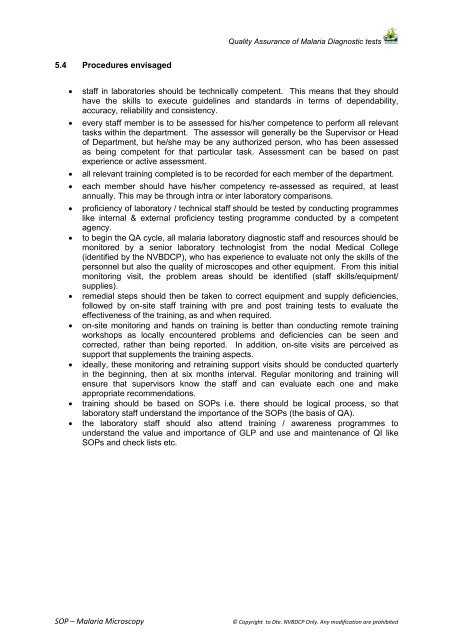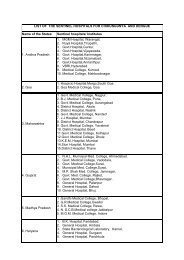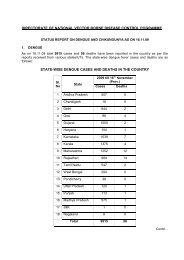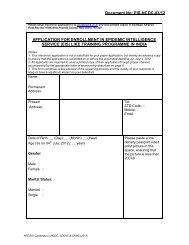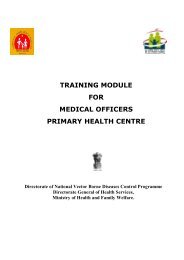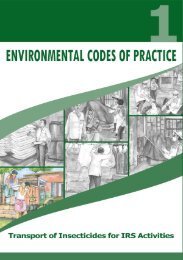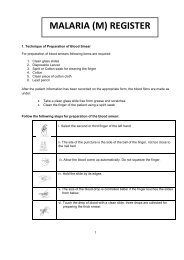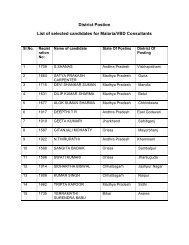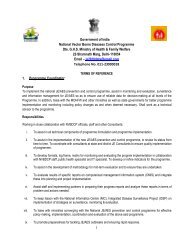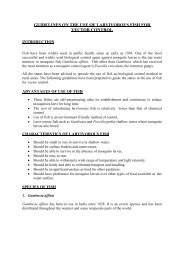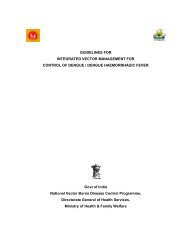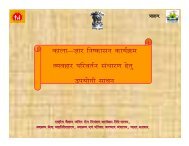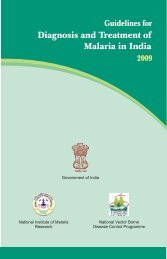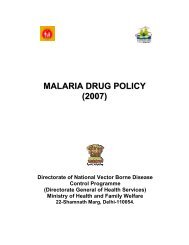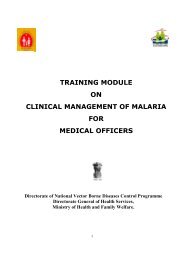SOP â Malaria Microscopy - NVBDCP
SOP â Malaria Microscopy - NVBDCP
SOP â Malaria Microscopy - NVBDCP
Create successful ePaper yourself
Turn your PDF publications into a flip-book with our unique Google optimized e-Paper software.
Quality Assurance of <strong>Malaria</strong> Diagnostic tests5.4 Procedures envisaged• staff in laboratories should be technically competent. This means that they shouldhave the skills to execute guidelines and standards in terms of dependability,accuracy, reliability and consistency.• every staff member is to be assessed for his/her competence to perform all relevanttasks within the department. The assessor will generally be the Supervisor or Headof Department, but he/she may be any authorized person, who has been assessedas being competent for that particular task. Assessment can be based on pastexperience or active assessment.• all relevant training completed is to be recorded for each member of the department.• each member should have his/her competency re-assessed as required, at leastannually. This may be through intra or inter laboratory comparisons.• proficiency of laboratory / technical staff should be tested by conducting programmeslike internal & external proficiency testing programme conducted by a competentagency.• to begin the QA cycle, all malaria laboratory diagnostic staff and resources should bemonitored by a senior laboratory technologist from the nodal Medical College(identified by the <strong>NVBDCP</strong>), who has experience to evaluate not only the skills of thepersonnel but also the quality of microscopes and other equipment. From this initialmonitoring visit, the problem areas should be identified (staff skills/equipment/supplies).• remedial steps should then be taken to correct equipment and supply deficiencies,followed by on-site staff training with pre and post training tests to evaluate theeffectiveness of the training, as and when required.• on-site monitoring and hands on training is better than conducting remote trainingworkshops as locally encountered problems and deficiencies can be seen andcorrected, rather than being reported. In addition, on-site visits are perceived assupport that supplements the training aspects.• ideally, these monitoring and retraining support visits should be conducted quarterlyin the beginning, then at six months interval. Regular monitoring and training willensure that supervisors know the staff and can evaluate each one and makeappropriate recommendations.• training should be based on <strong>SOP</strong>s i.e. there should be logical process, so thatlaboratory staff understand the importance of the <strong>SOP</strong>s (the basis of QA).• the laboratory staff should also attend training / awareness programmes tounderstand the value and importance of GLP and use and maintenance of QI like<strong>SOP</strong>s and check lists etc.<strong>SOP</strong> – <strong>Malaria</strong> <strong>Microscopy</strong>© Copyright to Dte. <strong>NVBDCP</strong> Only. Any modification are prohibited


